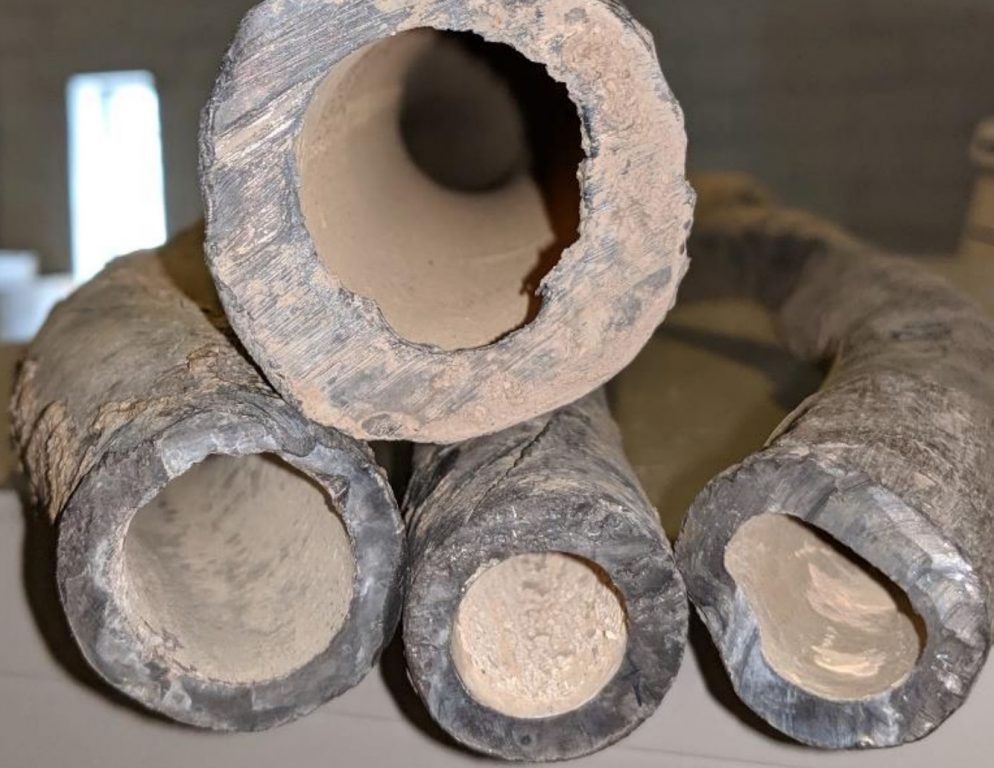Audit Gives Water Works High Marks
Outside audit of city utility found good practices for lead reduction, water quality monitoring.

Lead service lines replaced by the Milwaukee Water Works with corrosion control visible in pipe. Image from Milwaukee Water Works.
The City of Milwaukee’s water utility drew praise in an audit conducted by international professional services firm Jacobs Engineering Group.
The audit of the Milwaukee Water Works (MWW) was overseen by the City Comptroller’s office and centered on the utility’s corrosion controls practices. The report found that the department complied with all best practices and suggested 14 opportunities for improvement.
Deputy comptroller Aycha Sawa and representatives from Jacobs presented the report to the Public Works Committee Wednesday morning.
Broken into four sections, the audit examined corrosion control treatment, the distribution system, work to reduce sources of lead and public education.
“Are they adding the right solution and is it effective? The answer is yes on both accounts,” said Tony Myers of Jacobs.
The city’s practices of requiring broken lead pipes be entirely replaced and prioritizing funding for replacement of laterals at child care facilities drew praise from Jacobs.
The highest priority opportunity? “Accelerate development of privately-owned service line material inventory,” according to the report. The city has an inventory of approximately 73,000 known lead laterals, but buildings built in the 1950s and early 1960s could have lead laterals on the property owner’s side. MWW mailed those property owners instructions on how to check and, as of 2018, expected that less than five percent of the 33,000 properties have lead laterals.
The city’s efforts to replace lead laterals is complicated by the fact that half of every lateral is privately owned and the state restricts what revenue can be raised from water customers and spent on replacement. A pending Common Council file from the 2020 budget tasks the utility to come up with a plan to support voluntary, private replacements.
Other recommendations include strategies to better circulate water being held to minimize its age. Jacobs will be working with MWW on a loop pipe study.
Myers cautioned that it would take years to implement all of the recommendations.
“I’ve taken the policy that when you’re working with public safety and with drinking water you should make no moves quickly,” said MWW superintendent Karen Dettmer about her approach. She’s led the utility since early 2019.
“The compliance started under superintendent Carrie Lewis and was carried through with superintendent Jennifer Gonda,” said Dettmer, who also praised the utility staff.
The city’s water became a national issue with the 1993 cryptosporidium contamination and ensuing public health crisis. Alderman Michael Murphy pushed Dettmer to remember that and make sure any new policy is exhaustively studied.
“A lot of stuff, a lot of very good stuff, a lot of intricate stuff,’ said Alderman Mark Borkowski about the report.
The utility’s practices are of concern to more than Milwaukee residents. MWW provides water to 16 communities and has a pending deal with Waukesha. The district’s website estimates that 866,993 people drink its water.
But the utility won’t be able to maintain compliance by standing still. “These best practices are evolving. A lot of this is coming on the tail of [water crises in] Flint and Newark,” said Moore. ” We used the best available information right now.” The study was done, in part, in anticipation of revisions to the federal Lead and Copper Rule.
The department’s strong corrosion control practices doesn’t mean there’s no lead poisoning problem in the city. The utility has $13.4 million allocated to replace 1,100 laterals this year and both the utility and Milwaukee Health Department recommend that residents with lead laterals or interior pipes use a water filter to remove traces of lead.
Legislation Link - Urban Milwaukee members see direct links to legislation mentioned in this article. Join today
If you think stories like this are important, become a member of Urban Milwaukee and help support real, independent journalism. Plus you get some cool added benefits.
Related Legislation: File 191815
More about the Lead Crisis
- Gov. Evers Approves Bill to Support Lead Service Line Replacement in Superior - Gov. Tony Evers - Jul 1st, 2025
- MPS’s Westside Academy Cleared of Lead Risks After Stabilization Work - Milwaukee Public Schools - Jul 1st, 2025
- MPS Plans Lead Remediation at 40 Schools This Summer - Evan Casey - Jun 27th, 2025
- Baldwin, Reed Demand Written Answers from RFK, Jr. on Firings of Childhood Lead Poisoning Experts at CDC - U.S. Sen. Tammy Baldwin - Jun 11th, 2025
- MPS’s LaFollette School Cleared of Lead Risks After Stabilization Work - Milwaukee Public Schools - Jun 11th, 2025
- Sen. Baldwin Hears From Parents About MPS Lead Crisis, Chides RFK Jr. - Evan Casey - Jun 9th, 2025
- Reps. Margaret Arney and Darrin Madison Urge Joint Finance Committee to Reinstate Essential Lead Abatement Funding - State Rep. Margaret Arney - Jun 5th, 2025
- Gov. Evers, DHS Continue Administration’s Efforts to Combat Lead Poisoning Statewide with Permanent Rule - Gov. Tony Evers - May 27th, 2025
- RFK Jr. Claims ‘Team’ Is In Milwaukee Helping With Lead Crisis, Health Department Can’t Find Them - Nick Rommel - May 22nd, 2025
- MPS Announces Starms Early Childhood Center Is Cleared of Lead Dangers - Milwaukee Public Schools - May 21st, 2025
Read more about Lead Crisis here
Political Contributions Tracker
Displaying political contributions between people mentioned in this story. Learn more.























